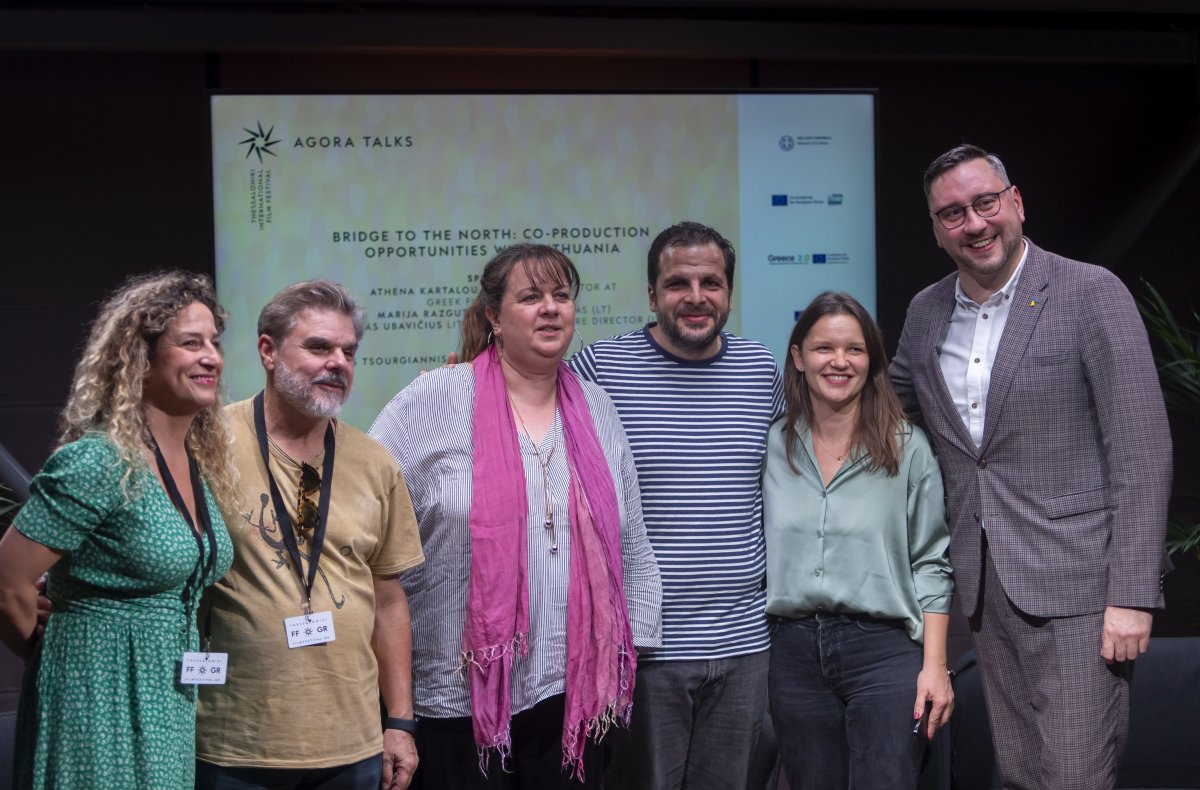The new Agora initiative, Bridge to the North, introduces a synergy between north and south. Each year as part of the action, the Festival will be hosting a different guest country from the Baltic or Scandinavia. Lithuania is this year’s guest country. The discussio titled “Bridge to the North: Co-production scopes with Lithuania” took place on Monday 6 November at MOMus - Thessaloniki Museum of Photography, as part of the Agora Talks of the 64th Thessaloniki International Film Festival.
Bridge to the North is exploring new scopes in financing and exchange of creative ideas. Professionals who had the opportunity to make co-productions with Lithuania shared their experience and focused on the prospects and benefits that can arise from possible collaborations with the national film centres of the two countries.
The speakers were Athina Kartalou (director of the Greek Film Centre, Greece), Maria Razgute (producer, M-Films, Lithuania), and Laimonas Ubavičius (director of the Lithuanian Film Centre, Lithuania). The discussion was moderated by George Tsourgiannis (producer, Horsefly Productions, Greece).
The discussion was introduced by Angeliki Vergou, Head of the Agora: "We are excited about the prospects arising from the Bridge to the North initiative", she stressed. "This year's guest country, Lithuania, is a country very close to us, though we have never worked together. This is a great opportunity for cultural exchange and cooperation," she added.
George Tsourgiannis, the moderator, introduced the participants of the panel and gave the floor to Laimonas Ubavičius from the Lithuanian Film Centre. The latter thanked the Festival for its hospitality and wished this initiative to be the beginning of a long-term cooperation in the field of co-production. Speaking about the Lithuanian Film Centre and financing opportunities, he noted that it finances the production and promotion of films, as well as the propagation of film culture through film festivals. It also approves funding for Lithuanian film production, but also finances co-productions (majority and non-majority) with other states.
Through a system launched in January 2014, the Lithuanian Film Tax Incentive, professionals have the opportunity to save resources through a process of private investment. As a filmmaker from abroad, one can work with a Lithuanian production company covering 30% of the production budget in exchange for reduced income tax. In this way, the director also saves money from the budget and the Lithuanian company enjoys reduced income tax. In 2022, film productions received €17.86 million from private investors, while total cost rose to €59.34 million.
Athena Kartalou, from the Greek Film Centre, took the floor to talk about all the steps taken from the Greek side. "We have met with Laimonas many times over the last two years and we believe that the two countries have much in common," she said. "We thank the Festival for taking this initiative allowing us to open the door to collaboration. Lithuania is gradually oriented, from co-productions with countries such as Germany and France, to countries with common production potentialities such as Greece. There is a lot of room for cooperation with Lithuania", she stressed out and presented the facts and figures of the Greek Film Centre.
GFC deals with the financing of many different types of films (covering the greater part of the cost or not). So far, for the year 2023, GFC has funded 78 projects, including 15 feature films with the amount of 1.32 million euros, 24 short films with the amount of 556,800 euros and other film categories. The total cost reaches 2,816,800 euros. In the period 2021-2023, GFC supported 40 co-productions with a total cost of 5.61 million euros. GFC also presents five new funding programmes supported by the European Union (micro-budget - short, micro-budget - plus, development, co-production window, the Future is Here).
Maria Razgute, Lithuanian producer, explained that the system described by the director of the Lithuanian Film Centre, works extremely well, as she can corroborate by personal experience. She went on to present data and examples from her own production company on projects co-funded by Lithuania and other countries. Finally, both sides benefit from the advantages of co-production. Finally, Athena Kartalou mentioned that in the past the co-productions were a result of a combination of different cultures that did not work out well. Nowadays, the landscape has evolved and things have changed. She stated that, as a professional, she believes in the culture of European films and the only way to express it is through the co-production scheme, something all speakers agreed upon.















